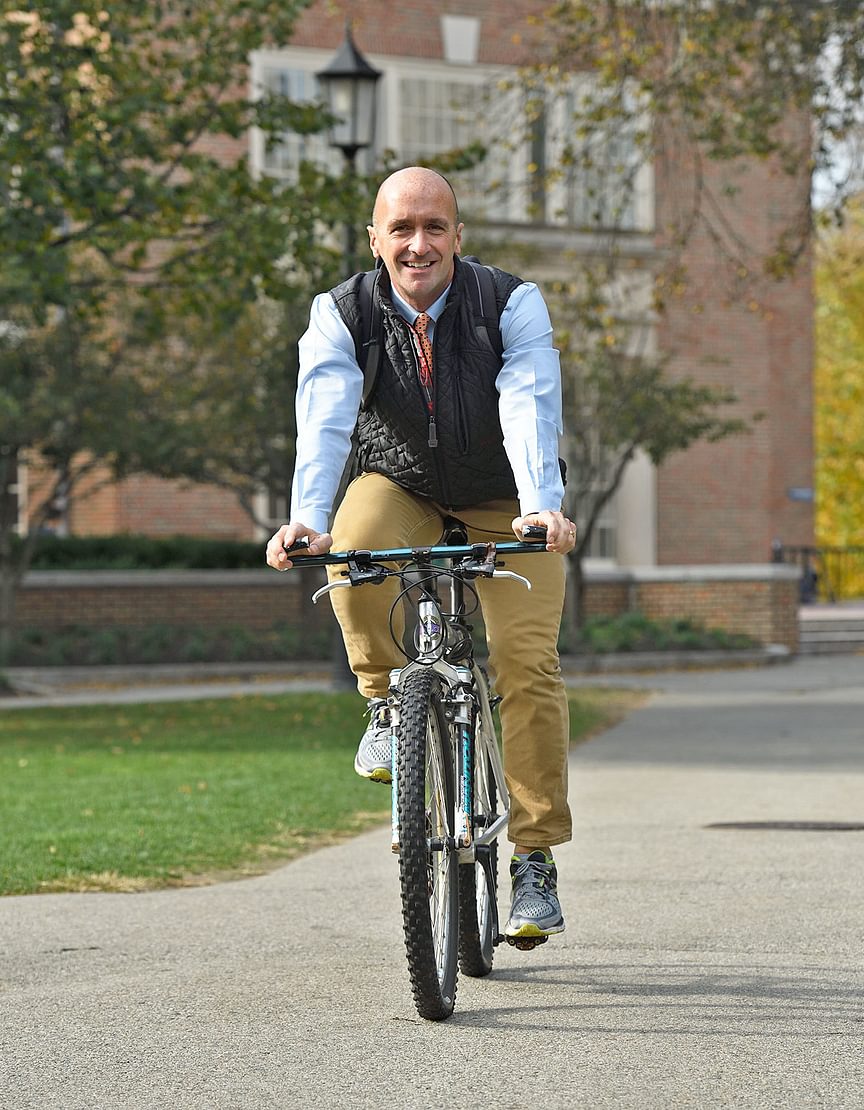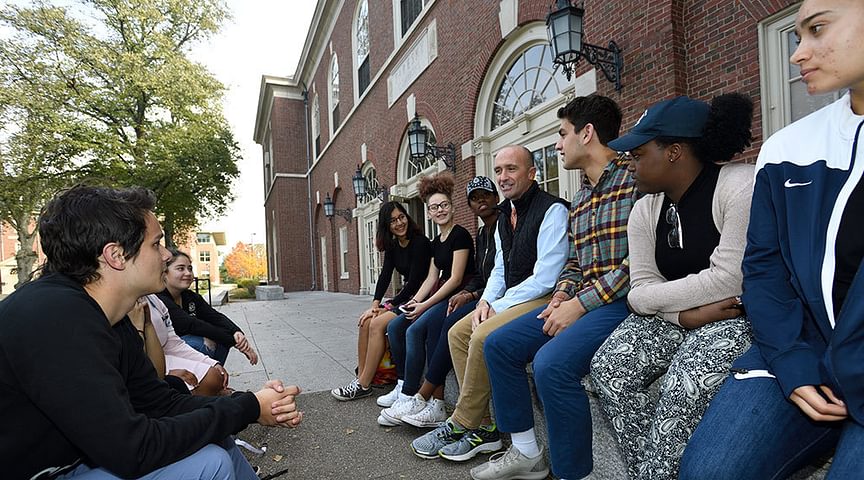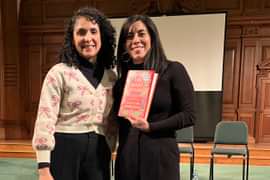
December 12, 2017
Thoughts on teaching
Paul Murphy ’84, P’16, ’19 talks pedagogy, life as a dean and raising a family on the Andover campusby Jill Clerkin
Paul Murphy ’84 is all about kids. Legions of Phillips Academy students have been taught and coached by Murphy, whose 29-year PA career includes work as a house counselor, cluster dean, Summer Session director, dean of students, math teacher, and water polo and swim coach.
Whether tooling around campus on his bicycle or stopping by Paresky Commons, Murphy is a recognizable figure at PA, one that kids can connect with about their successes, struggles, and mistakes. Murphy’s PA connections run deep; his dad is a 1961 grad, daughter Maddie graduated in 2016, and son Tyler is an upper. His wife, former director of alumni engagement Debby Murphy, is also a 1986 PA alumna.
It might seem like a slam dunk that the likeable, outgoing PA grad would sign on as a teaching fellow after college, but Murphy credits the Academy’s sports requirement for tipping the scales in his favor.
How did you like being a day student?
PM: My friends were mostly day students too, so we all hung out in the library. I did all my studying there. It was great. Makes me sound like an old guy, but the sense of place is so real—visually and the smells. It hasn’t changed much. The librarians were like my house counselors. I knew everything about them, and they knew everything about me. It was fun. I’d leave at 9:30 or so, walk four blocks home, and come back the next morning.
What sports did you play at Andover?
PM: I played football one year and did some soccer, lacrosse, and crew. I wasn’t terribly good at any of it. But I learned to be a competitive swimmer when I was here—definitely not something I would have done if PA hadn’t required a sport every trimester.
Later, at Bates College, I became a strong competitive swimmer. When I applied to be a teaching fellow, I was replacing Loring Kinder for a year—a math instructor who was also a swim coach. I think what they actually needed was a swim coach who could teach math. I fit the bill and ended up coaching boys’ varsity swimming my first year, then the girls’ varsity team from 1991 to the present. I also coached water polo for 10 years.
When did you first feel the impact of technology on teaching?
PM: Right when I started as a teaching fellow in 1988. The TI-81 graphing calculator had just come on the scene. Most instructors were all over it. We no longer had to spend a week trying to teach how to graph a parabola. We could do more and deeper work. It was fascinating to be part of that transition.

I try not to pigeonhole kids. When they come to a place like this, they should be able to redefine themselves as much as they want to.
”How does critical thinking come into play in the math classroom?
PM: Scholars today need to be able to use data and pictures to tell a story—and also be able to interrogate what they’re seeing. They cannot simply accept everything that is thrown at them.
Pictures and numbers are being used to push people toward a particular way of thinking. For example, you can make a graph look like the number of immigrants has skyrocketed. But no—take a look at the Y axis. It might actually be saying it’s only increased by 1 percent.
Since the election, there seems to have been a lot more scrutiny. Whether you call it fake news or not, media outlets have long been choosing what to put out there for the public: which photo to use of this or that candidate, how dramatic a graph looks. It’s hugely persuasive.
How do your own PA experiences influence your interactions with students?
PM: I can put myself in their shoes. Andover was not a breeze for me. It’s a hard school. I know what it’s like to do tons of homework, to struggle to do well on a test and get a 78. It’s like, “What happened to me? I used to get straight A’s!” I definitely have that sense of what the kids are going through.
Was it ever overwhelming to be a dean?
PM: Cluster deans handle big stuff. It was real. I loved it. I was still teaching two classes, and by that time [1999], I had been coaching the girls’ swim team for eight years.
That was a nice escape. There were definitely times when I had six major things happen in just one day. But you do get used to it. Even when I began serving as dean of students, I told Temba [Maqubela] that I wanted to keep coaching and teaching.
What was your approach to discipline?
PM: A couple of years into cluster deaning, I remember sitting three or four students down in my living room to talk about what they’d done on Saturday night. I asked each of them to tell me their story, how they got to Andover. I would always kind of walk it back and figure out where each kid was coming from. I didn’t want to just talk about what they did wrong. Then I’d say, “I know something else about you: you’re not lucky. Because you were not the only kids drinking Saturday night, but you got caught.”
I wasn’t trying to be funny. I wanted them to know that I didn’t think they were awful people. They’re just kids. They’re smart kids who do dumb things sometimes. In those rough moments, students need to feel like they’re human beings.
What are the pros and cons of living on campus?
PM: My wife, Debby Burdett ’86, and I met during her first year in the admission office. When I was a house counselor in America House, we didn’t have our own kids yet, but 17 ninth-grade boys were in our house all the time. After cluster deaning for six years, I spent three years directing Summer Session and we lived away from the main campus. That was 2005 to 2008. Sydney was one, Tyler was four, and Maddie was seven. We were so accustomed to weaving our life with the life of the school that we felt strangely disconnected during those years. But it was a good break. We noticed it most at night. Everyone can go to bed. And you can feel pretty sure the phone’s not going to ring and you’re not going to have to leave in the middle of the night.
You were elected to the Town of Andover School Committee in spring 2016. Why take that on?
PM: All of my kids attended Andover’s public elementary and middle schools, and my youngest is still in middle school. I don’t know public education, but I’ve certainly got many years of experience in education. I figured I’ll participate, learn something, and do some crossover stuff. It’s been super interesting. In the meetings, more often than not, presentations are made about new initiatives at the high school, and I think we should be doing that.” [Laughs] Every school can’t do everything, but a little cross-pollination—that’s good.
I’ve also become a resource for townspeople who have questions about PA. I’ve made the Academy a little less mysterious, which is good for the school and the town.
The world is changing and, as adults, we can’t be clueless about this stuff. When there’s a questionable posting on Twitter or Snapchat or Instagram, we need to at least be conversant; we need to know how new technology and social media work, because our students sure do. Otherwise, more walls go up between generations.
”What keeps it fresh after nearly three decades?
PM: It’s so cliché to say that I love the kids, but I do. I love their stories. I like to get to know students. Who are they right now? It’s quite remarkable that some of them are here. I have such respect for what they’re doing day in and day out.
Your son is at a boarding school in the Bahamas for fall term. How’s that going?
PM: Tyler’s studying marine biology at The Island School. No social media allowed. He committed to 100 days of not cataloging his life or watching the lives of all his friends, which is great. He’s living face-to-face. Meanwhile we get a 20-minute phone call once a week—not even a text. It’s certainly given Debby and me a stronger sense of what it’s like to send a child to a distant boarding school.
Back in September, Hurricane Irma was heading right for the Bahamas. We were super nervous, but we just had to trust the adults down there. The teachers wrote to all the parents twice a day about how they were preparing—like putting the kayaks in the library and shutters on the dorms. They never considered leaving the island, because they have to deal with hurricanes all the time. That was some unexpected experiential learning.
What new issues are you seeing among students?
PM: The most recent thing that I am reading about and seeing is anxiety—sometimes with a little “a,” sometimes a big “A.” This idea that you get anxious and you’re not really sure why. I’m not ready to pin it on one thing, but I’d like to. Too much information coming at them all the time. Teenagers back in 1999 had an inkling about world events if they had the oomph to go into the library and pull out the New York Times. Because there wasn’t time to watch TV news. The Internet didn’t exist, so you couldn’t watch CNN whenever you wanted to. The bubble had some advantages.
Have concepts of diversity changed?
PM: When I went off to college in Maine—Bates—I remember thinking two things. First, the campus is nice, but not as nice as my high school. There was a smokestack in the middle of it. Second, where are the people of color? In my 18-year-old mind, diversity meant racial diversity. What people looked like. There definitely were students of color at Bates, but I didn’t know what I’d had at Andover until I left.
Through the ’90s, it felt really good to finally talk about what it’s like to be—for lack of a better word—different. Maybe just non-white and non-male. Lots of conversations about gender emerged. And the early 2000s brought conversations about socioeconomic differences—the big invisible. It was a relief to finally crack that open. Bobby Edwards, Becky Sykes, and Linda Griffith, among others, have been real leaders and mentors over the years.
How will teachers manage all the social media “noise” in the years ahead?
PM: I predict reflection and meditation will become even bigger solutions to a range of health issues. Brain rest will become a priority. Kids and adults will set goals for “no-screen time”—a time to relax and not worry about what everyone else is doing.
If you don’t have down time, where does your creativity go? How do you come up with original thoughts? How do you solve the world’s problems? It’s like the firehose metaphor. If it’s always coming at you, how do you breathe?





